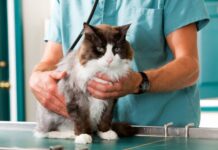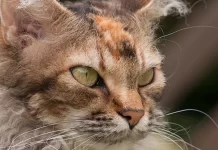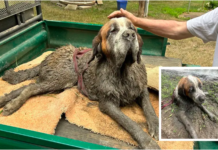Last Updated on September 9, 2023 by Fumipets
Is My Cat Too Underweight? Here’s How to Tell if Your Cat is Too Skinny
Determining whether your cat is underweight is essential for their health and well-being. Cats can be naturally slim, but being excessively underweight may indicate underlying health issues.
Monitoring their weight, observing their body condition, and consulting with a veterinarian are crucial steps in assessing their overall health. Here are five common questions and answers regarding whether your cat is too underweight:
Is My Cat Too Underweight?
Cat owners are frequently urged to refrain from overfeeding in order to prevent feline obesity. Though obesity is more prevalent, being underweight is as dangerous. Cats must be given the proper quantity of wholesome, nutrient-rich food in order to maintain a healthy weight.
It’s crucial to speak with your veterinarian if you think your cat may be underweight or losing weight. Particularly if there is an underlying illness condition impacting your cat’s weight, only they will be able to accurately tell you if their weight or weight loss is a worry and advise you on how to address it.
Tests To Determine If Your Cat Is Underweight
You can perform a few tests at home to determine whether your cat is underweight.
To feel your cat’s ribs, run your hands over their sides. Your cat may be underweight if their ribs are prominent and easy to feel without exerting any force.
Another way to tell if your cat is underweight is to feel their spine. Cats with a healthy weight don’t have a particularly prominent spine.
the American Veterinary Association’s recommended body condition score for your cat. Your cat may need assistance if its body score is below three on a five-point scale or five on a nine-point scale, which indicates underweight.
The first step in identifying whether your cat is underweight or merely slender-built is to utilize these at-home tests. If you notice that your cat has an obvious spine or ribcage, you should take them to the vet for a follow-up exam.

Helping An Underweight Cat
If you think your cat may be underweight, there are a few things you can do to assist.
You should start by keeping an eye on your cat’s feeding habits. If they aren’t finishing their meal or seem to be losing their appetite, this could mean a number of different things. Giving your veterinarian as much information as you can aid them in developing a sustainable treatment.
Make sure you are giving your cat the proper quantity of food if they are gobbling it up and are still hungry for more. Make sure they are eating enough for their size, age, and level of activity. varied kinds of cat food have varied feeding needs. Your veterinarian can advise you on the best cat food and feeding frequency if you’re unsure.
It is important to make sure your cat is receiving all of her food if you have numerous cats. At mealtimes, cats may be aggressive, and one cat may sometimes miss out on food. Keeping all of your feline friends healthy may be achieved by feeding them in different spaces.

How To Help A Cat Gain Weight
There are various strategies to assist an underweight cat in gaining weight once your veterinarian has ruled out any underlying medical issues.
Some felines only need more food. They might be offered access to free dry food or extra daily meals. Many cats would rather “graze” throughout the day than eat more substantial meals at set times.
Feed numerous cats separately as said previously since one of them can protect the food and prevent your underweight cat from eating. Always ensure that your cat has a secure, unthreatening area in which to feed.
If your cat is timid or anxious, make sure that nothing noisy, like a fan, an air conditioner, or the furnace, is located close to where they eat.
Try introducing some wet food to your cat’s dry kibble diet if they are underweight, or vice versa.
Cats may be picky eaters on occasion. Your cat could benefit from consuming more calories if you try a different taste or brand. To rule out any digestive issues or dietary allergies that could be preventing your cat from eating, switching protein sources might also be a smart idea.
Purchase a high-quality fish oil and include the required dosage in their daily routine. The daily calorie intake will rise as a result, and extra health advantages will result.
Cat food may be made to smell and taste better by briefly heating it in the microwave.
Making your cat’s food more appealing can also be accomplished by adding some water or unsalted chicken broth.
Some cats just need more calories in their diet since they have greater metabolic rates than others. Senior cats may need senior cat food, which is easier to digest than typical adult cat food.
Conclusion
Consult your veterinarian if you believe your cat is underweight to ensure that their weight loss isn’t being caused by an underlying ailment and that they just need more calories in their diet. There are various actions you may do to enhance your cat’s intake and make their food more enticing if they aren’t eating enough.
Frequently Asked Questions
How can I tell if my cat is underweight?
You can assess your cat’s weight by feeling their ribs. If the ribs are easily felt without pressing too hard, your cat may be underweight. Additionally, an underweight cat may have a prominent backbone and visible hip bones.
What are the potential causes of cat underweight issues?
Several factors can contribute to a cat being underweight, including poor nutrition, parasites, dental problems, underlying illnesses, stress, or a sudden change in diet.
What is the ideal weight for a cat?
The ideal weight for a cat can vary depending on breed, age, and individual differences. Consult with your veterinarian to determine a healthy weight range specific to your cat.
How can I help my underweight cat gain weight?
Consult your veterinarian to rule out underlying medical issues. They may recommend a specialized diet, frequent feeding in smaller portions, and addressing any dental problems. High-quality cat food and proper nutrition are key.
When should I see a veterinarian about my cat’s weight?
If you suspect your cat is underweight, or if they experience sudden weight loss, changes in appetite, or other concerning symptoms, consult a veterinarian promptly. They can diagnose any underlying issues and recommend a tailored treatment plan.
Monitoring your cat’s weight and seeking professional guidance when necessary is essential for maintaining their health. Regular veterinary check-ups can help ensure your cat is at an appropriate weight and address any concerns early on.


















